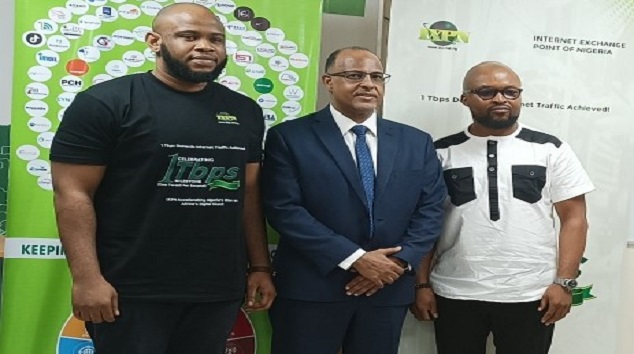Telecom
UBA, Ecobank, Others Turn to IBM Hybrid Cloud and AI Solutions to Accelerate Digital Innovation

IBM on Wednesday announced that major financial institutions across Africa have selected hybrid cloud and AI capabilities from IBM to unlock digital innovation and continue their work to develop digital-first solutions, ultimately broadening access to financial services on the continent.

COVID-19 continues to accelerate the already rapid changes that were happening across the financial services sector in Africa, fast-tracking the adoption of digital technologies to boost financial inclusion. With over 475 million Africans expected to be mobile internet users by 2025 GSMA –The mobile economy sub-Saharan Africa 2020, digital and mobile play a critical role in facilitating the delivery of digital financial services to consumers who transact on their mobile phones.
As banks focus their efforts on open innovation, security and high-value services, hybrid cloud solutions have become increasingly important to deliver seamless and secure digital banking experiences.
“Enterprises, especially those in highly regulated industries like financial services, face unique challenges when it comes to balancing innovation and regulatory compliance,” says Alan Peacock, General Manager, IBM Cloud.
“For decades, IBM has been fuelling the transformation of the financial services industry, bringing IBM’s trusted industry experience and leadership in security and data privacy to help banks modernize, transform operations and drive innovation.”
According to IBM’s COVID-19 future of business study, more than 59% of the organisations that participated said that the pandemic accelerated digital transformation, and more than 75% of responding executives indicated they expect changed customer behaviour to continue after COVID-19.
As companies in the financial services sector are speeding up transformation, IBM hybrid cloud and AI solutions are supporting their drive to accelerate digitalisation in different parts of the continent.
“In the past year we have seen banks navigate changes brought on by a growing preference for digital and mobile solutions, increasing smartphone penetration and the demand for convenience, innovation, and simplicity from today’s modern consumer, says Angela Kyerematen-Jimoh, Regional, General Manager for IBM North, East and West Africa.
“As banks across the continent take advantage of the opportunity to provide digital financial services which boost financial inclusion, IBM is working with Africa’s leading financial groups to deliver intelligent, cloud-based, digital-first innovation through IBM’s hybrid cloud and AI capabilities.”
Ecobank, the pan-African banking conglomerate, with banking operations in 33 African countries, has adopted a hybrid cloud approach to extend its reach to millions across Africa.
Using IBM Cloud, Ecobank migrated their flagship mobile banking application to leverage the on-demand capacity of resources that can support sudden spikes in traffic on its mobile banking services. Ecobank also has access to other IBM cloud services that can be used to develop more innovative, digital-first solutions to enhance their own client experience.
With over 12 million customers on its flagship mobile application, Ecobank is on an accelerated digital banking transformation journey and is set out to expand its digital offerings and grow the 30 million digital transactions it already processes on its platforms. As part of this journey, the Pan-African banking conglomerate has built scalable business solutions which allow for ease of integration with third-party providers using their open digital banking platform for a growing customer base.
Pan-African bank, Nedbank has set out to deliver superior digital experiences to customers. To achieve this, the bank is modernising its core banking applications with a hybrid cloud strategy and has partnered with IBM to help bring digital products and services to life.
To take advantage of the flexibility and agility offered by modern cloud technologies on this digitalisation journey, Nedbank explored a hybrid multi cloud approach, adopted the IBM Garage methodology to implement IBM Cloud Pak for Integration.
Through IBM Garage, the bank was able to deep dive and explore fresh solutions and in a week achieved what would have taken them months. Faced with the need to integrate complex legacy systems, Nedbank turned to IBM Cloud Pak for Integration to help build a simplified and standardised integration approach to their cloud strategy.
This enables Nedbank to shift their legacy applications into the cloud and integrate with other cloud-based applications they are consuming as they modernise and position for future innovation.
Attijariwafa bank, the Pan African Banking and Financial Group, has adopted IBM hybrid cloud solutions software to advance the digitisation of its banking operations, and quickly bring new digital services to its customers, all in a secure and flexible environment.
Using IBM Cloud Paks that are built on Red Hat OpenShift, the leading bank will streamline and better integrate front-and back-office processes and to modernise business and IT operations.
By deploying IBM Cloud Paks, Attijariwafa bank will modernise and manage its core banking applications like its corporate banking application, on a secure, integrated and easily scalable environment.
This will allow a rich and simple customer interaction while decreasing the time to bring new offerings to market. It will also enable the banks’ employees to focus their effort and time on serving their customers better.
This collaboration with IBM supports the digital transformation strategy of the bank and facilitates a full modernisation of the bank’s operations in an open, hybrid cloud environment.
United Bank for Africa Plc (UBA), Africa’s global bank operating in 23 countries globally and with headquarters in Nigeria, has set a goal to grow its transaction volume significantly over the next few years and to deepen retail market penetration.
To achieve this, they would be required to attract the unbanked, acquire new customers through digital banking and retain existing customers by adopting a “No Transaction Must Fail (NTMF)” initiative.
Using IBM POWER9-based servers, Flash system storage and IBM PowerVC (Power system virtualization & cloud management), UBA set up a scalable, private cloud environment that is cost-effective taking the first step towards embracing a hybrid cloud model.
Customers’ needs are evolving as they seek banking services across channels and expect personalization. Co-operative Bank of Kenya turned to IBM to modernize their core banking platform and reach their customers on different channels including mobile and online while offering customized services driven by insights.
For this, they required a technology that would also empower their employees who work across teams to simplify processes, optimize customer data, while also achieving goals like reducing infrastructure and maintenance costs. With IBM Power and FlashStorage solutions, they now derive improved insights on customer data, faster query resolutions, quicker time-to-market on new services across channels – all backed by high available, scalable, cloud-and AI-ready technology.
Banco Mais, a leading bank in Mozambique, turned to IBM to help streamline its business processes and reduce turnaround times for customer-facing services. In the face of a growing competitive market locally, Banco Mais needed to develop financial service products faster to retain and gain market share.
Banco Mais implemented IBM Business Process Manager on Cloud service and was able to start projects quickly and deploy process application solutions without the need to build the IT infrastructure. By turning to this IBM Cloud solution, they could develop, test, run and monitor their business processes at a fraction of the time it would otherwise have taken. As a result, Banco Mais reduced turnaround time for loans by 60% and decreased the time it took to implement services that took 3 to 4 months by 85% to improve customer experiences.
Earlier this year, IBM announced the general availability of the industry’s first financial services-ready cloud platform, IBM Cloud for Financial Services, as well IBM Cloud Satellite. First revealed in 2019, the IBM Cloud for Financial Services is designed to help reduce risk for financial institutions, their partners and FinTechs, and innovate quickly with built-in controls that are adhered to by the entire ecosystem. IBM Cloud Satellite brings a secured, unifying layer of cloud services for clients across environments, regardless of where their data resides, delivering security, data privacy, interoperability and open standards found in hybrid cloud environments.
Telecom
Nigeria Hits 1 Terabit Internet Traffic Milestone

IXPN, Nigeria’s leading Internet Exchange Point, is proud to announce a landmark achievement: crossing 1 Terabit per second (1Tbps) in aggregate peak domestic internet traffic for the first time.

This milestone signifies a major leap forward in developing Nigeria’s internet infrastructure and underscores the critical role of local internet infrastructure in driving economic growth, innovation, and connectivity for millions of Nigerians.
“This milestone is more than just a number. It’s a symbol of Nigeria’s digital maturity and our united strides towards becoming a tech-driven nation. By keeping local internet traffic within Nigeria, we reduce costs, improve speeds, and ensure our digital economy thrives with homegrown infrastructure.” said Muhammed Rudman the CEO of IXPN.
“Achieving 1 Tbps is a significant victory for Nigeria’s ICT ecosystem, a breakthrough for domestic internet traffic. It serves as a catalyst, enabling millions of Nigerians to enjoy faster, more affordable, and resilient internet connectivity.”

1 Terabit per second is a game-changer for Africa’s most populous country. To put it in perspective:
- Mega Video Calls: A speed of 1 Tbps can support over 1 million concurrent Zoom calls, allowing students, entrepreneurs, and professionals to connect and drive Nigeria’s digital revolution.
- Streaming Frenzy: With 1 Tbps, more than 200,000 people can stream HD Nollywood films or movies on Netflix simultaneously without any buffering or interruptions.
- Data Superpower: This speed enables the transfer of the entire contents of 50,000 smartphones—including photos, apps, and videos—in just one second.
For Nigeria, hitting this milestone means reducing reliance on international bandwidth, decreasing latency for local services, and strengthening our position as Africa’s digital heartbeat. This milestone is a testament to the power of collaboration, innovation, and the relentless pursuit of a faster, more connected Nigeria.
This accomplishment goes beyond technical advancements; it has significant economic implications. By encouraging local traffic exchange, IXPN reduces dependency on international bandwidth, leading to:
- Significant Cost Savings: By utilizing local data exchange, Nigerian businesses can save millions of dollars annually on international bandwidth fees.
- Enhanced Speed and Connectivity: With reduced latency, users experience smoother streaming, gaming, and real-time services, enhancing their overall online experience.
- Increased Resilience: Strengthening Nigeria’s internet infrastructure protects against global disruptions, ensuring consistent access to vital services such as healthcare and education.
- Improved Efficiency: Optimizes digital services like fintech, edtech, e-commerce, and e-health, propelling innovation and growth in these sectors.
Surveys conducted among IXPN members over the years have shown a growing percentage of local internet traffic in Nigeria. A recent report indicates that some connected members can localize or domesticate up to 70% of their internet traffic through IXPN.
“As more content providers, ISPs, banks, and public institutions localize their traffic through the IXP, end users benefit directly,” added Raphael Iloka (Marketing Manager). “We’re not just routing data — we’re building the foundation for Nigeria’s digital economy.”
The 1 Tbps peak highlights the remarkable impact of collaboration among all stakeholders. This milestone is a significant achievement not only for IXPN, but for the entire ICT ecosystem. IXPN deeply appreciates the vital contributions of all stakeholders involved.
To our Members and Partners: Your trust and participation have been essential to our growth. Together, we have established a hub where networks can interconnect, innovate, and thrive.
To the Government and Regulators: We express our sincere appreciation to the Nigerian Communications Commission (NCC) for all its support over the years and its vision of a digitally inclusive Nigeria.
To our Team: We extend our gratitude to our engineers, network administrators, and all other staff who work tirelessly behind the scenes to push boundaries.
To the Global Community: We are grateful to partner organizations like the Internet Society (ISOC). Your support and advocacy in domestic peering empower us all.
Reaching 1 Tbps is just the beginning. As data demands skyrocket with AI, IoT, 5G, and immersive technologies, IXPN is committed to staying ahead of the curve. Here’s how:
- Scaling Infrastructure: We are investing in advanced hardware and software to support multi-terabit capacities.
- Enhancing Resilience: We are strengthening our network to ensure uptime, security, and adaptability in an ever-changing digital landscape.
- Empowering Underserved Communities: We aim to expand our reach to rural areas, bridging the digital divide, and supporting agritech, edtech, and telehealth.
- Strengthening Africa’s Digital Sovereignty: Partnering with regional IXPs to keep Africa’s data on the continent.
Telecom
TD Africa’s TecHERdemy Empowers 400 Women to Lead in Tech

On April 17, 2025, the atmosphere at Yudala Heights was electric with pride, hope, and inspiration as TD Africa, the leading tech distribution company in Sub-Saharan Africa, celebrated the graduation of 400 young Nigerian women from its flagship TecHERdemy program.

Over the past six months, these incredible women immersed themselves in rigorous, hands-on training in Cybersecurity, Data Science, Artificial Intelligence, and Software Development. They are now confidently stepping into the tech world, ready to make their mark.
The event brought together top voices in the industry, including Dr. Leo Stan Ekeh, Chairman of the Zinox Group, who commended the graduates for their resilience and brilliance. In his keynote speech, he shared a hopeful vision for Africa’s future, calling these young women “the pioneers of a new, inclusive era of tech leadership on the continent.”
Mrs. Chioma Ekeh, CEO of TD Africa, also delivered a heartfelt message, urging the graduates to let their values guide them as they navigate their careers.
“Hold tightly to your values. Let integrity guide your work, let innovation fuel your dreams, and let your impact speak louder than your résumé,” she encouraged.
The ceremony was filled with emotion as graduates shared their personal stories of transformation. One of them, Yetunde Kayode, now a certified data scientist, summed it up beautifully: “This program changed my life. I’m walking away empowered, skilled, and deeply grateful to Mrs. Ekeh and the TecHERdemy team for believing in us.”
Fifteen exceptional participants were also honoured for their outstanding performance and leadership during the program, reminding everyone that excellence comes in many forms.
TecHERdemy, which launched in November 2024, was built with a simple but powerful mission: to equip young Nigerian women with globally relevant digital skills and open doors to a tech career. But what happened over those six months went beyond just skills; it sparked a movement.
This graduation wasn’t just the end of a program. It was the beginning of a brighter, more inclusive future for tech in Africa.
Telecom
MTN Nigeria Faces Class Action Lawsuit over Alleged Data Mismanagement

Nigerians have launched a class action lawsuit against MTN Nigeria, accusing the telecom giant of unexplained data usage and rapid depletion.

The controversy erupted after a viral post on X (formerly Twitter) showcased an individual’s interest in taking legal action, along with evidence of unusual data activity.
This post rallied many others to join the cause, sharing their own grievances and pledging support.
A Google Form was circulated to collect names of affected users, highlighting issues such as false data top-ups and excessive costs without value.
Comparisons to data usage and pricing in other countries only fueled the frustration, and numerous Nigerians expressed their determination to pursue justice.
Social media buzz amplified the issue, with mixed reactions ranging from encouragement to skepticism about the lawsuit’s potential impact.
Meanwhile, MTN Nigeria has not yet released an official response to these allegations.

 Telecom3 days ago
Telecom3 days agoMTN Nigeria Takes Broadband Services to the Next Level with FibreX Launch

 News3 days ago
News3 days agoSERAP Files Lawsuit Against NBC Over Ban on Eedris Abdulkareem’s Protest Song Tell Your Papa

 Telecom2 days ago
Telecom2 days agoDigital Transformation Remains Africa’s Gateway to Economic Advancement – Adumike

 Telecom2 days ago
Telecom2 days agoPAFON 2.0: Experts Discuss Pathways to Boost Financial Inclusion in Nigeria

 E-Financial2 days ago
E-Financial2 days agoCBN, NGX Group Defend Economic Reforms at Nasdaq

 General News2 days ago
General News2 days agoEFCC Clarifies SCUML Certificate Misuse amid CBEX Ponzi Scheme Scandal

 E-Financial3 days ago
E-Financial3 days agoFCMB Group Redefines Corporate Storytelling with The Power Of The Group TVC

 General News2 days ago
General News2 days agoFlashChange Partners Ruth Foundation to Empower Vulnerable Children in Alimosho with Skill Acquisition




























